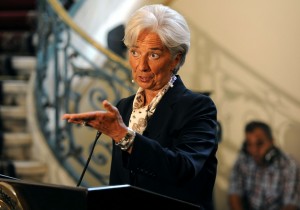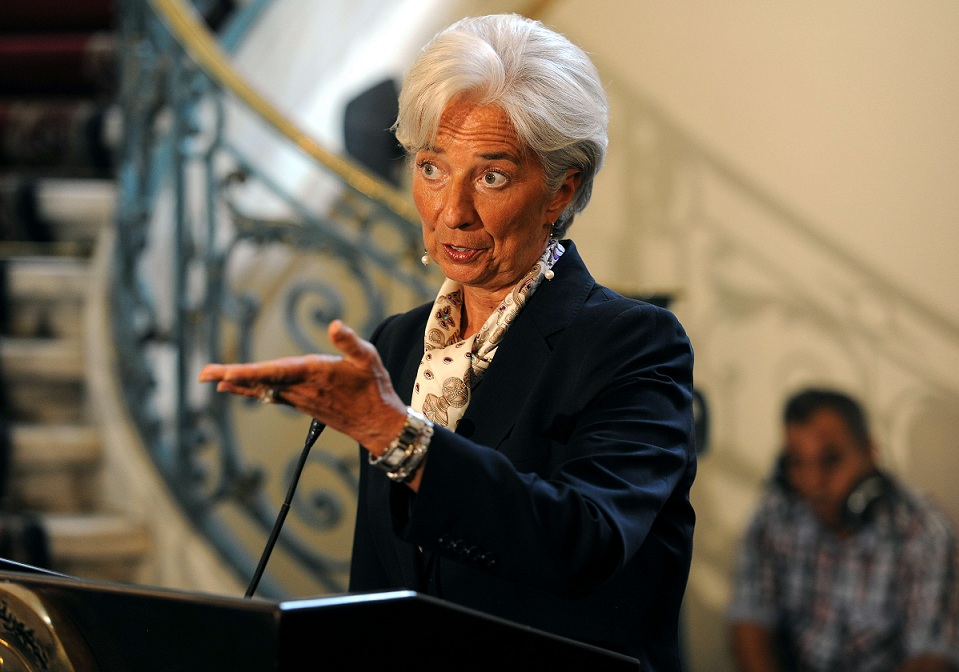
(AFP Photo)
By Lamia Nabil
Negotiations between Egypt and the International Monetary Fund (IMF) over the proposed $4.8bn loan have “gone back to the drawing board”, according to IMF Managing Director Christine Lagarde.
“We have been in negotiations with Egypt for quite a while now,” she said during a press conference on Thursday. “We have gone back to the drawing board.”
“I was in Egypt myself in August 2012,” she continued. “We had a programme that was just about ready in November 2012, when, as you know, political decisions were made to not put in place the fiscal decisions that were intended, which obviously made the whole programme redundant.”
She added, referring to the negotiations: “We have not concluded yet, and there is clearly more work to be done, more numbers to be aligned, and worked on. I very much hope that we can succeed, because I think the country is exposed to vulnerabilities. It has lost quite a bit of reserves and the Egyptian population deserves to have this economic ambitious goal to recover. It is growing, but the growth numbers could be certainly a lot better if the situation was stable from the financial and economic point of view.”
Lagarde said that what is “truly needed” to galvanise economic development in Egypt is “to respond to the needs of the population” in terms of “food, supply of power, jobs for the young generation”, as well as a “stable” political environment.
Commenting on the status of the negotiations, former Ambassador and Secretary General of the Union of Arab Investors Gamal Bayoumi said that Egypt’s government was currently stalling making any decisions in terms of effecting a reform programme to satisfy IMF requirements, because “it is afraid of losing seats” in the upcoming parliamentary elections.
The IMF met with Egyptian opposition figures last week including Mohamed ElBaradei, Hamdeen Sabahy and members of the Wafd Party. Sabahy said he opposed the IMF loan if “eliminating subsidies and raising prices would take place, hurting the poor”.
“I think the issues in Egypt are very important, very large,” said José Viñals, financial counselor and director for the Monetary and Capital Markets Department at the IMF, during a conference held on Wednesday. “They transcend economics.”
He also urged the authorities to clarify a number of “political uncertainties” and to “address the underlying serious economic issues that they have”.
“What is of the essence is to restore confidence,” he continued. “This is something which depends on economics, but also depends on politics.”
State-run Al-Ahram reported that the IMF delegation visiting the country last week had been critical of Egypt’s current economic reform programme which aims to make the country eligible for the $4.8bn loan, calling it “weak” and “not rigorous”, and expressing specific concerns over tax and subsidy reforms and tax hikes.
Media advisor to the minister of finance Mohamed El-Saqqa said, however, that the IMF was “satisfied” with the current reform programme.
Speaking of the proposed tax reforms, Martine Guerguil, assistant director of the Fiscal Affairs Department at the IMF, said: “Ensuring there are no undue loopholes in the tax capacity is an important element. Discussions are ongoing right now on different options that could be considered to contain the fiscal deficit. Tax is certainly an important element.”
When asked whether she prefers direct or indirect adjustment taxes, Guerguil said that there was no preference for either on the part of the IMF. “It all depends obviously on the country’s specificity,” she said. “In many countries, particularly in the Middle East, there is a significant degree of weakness in tax administration, or in tax evasion, that says the tax receipts are often less than the tax rate would make us believe. Therefore, it is important to look on a country-by-country basis. Where is the basis to effectively mobilise more revenue in an efficient and fair manner?”
Speaking to state-run media, Mohamed Mekkawy, foreign relations advisor to Egypt’s minister of finance, said that a “more detailed” plan would be presented to the IMF on Saturday when Egyptian officials are due to meet with Lagarde.
Union of Arab Investors Secretary General Bayoumi also said that the country’s leadership suffered from a lack of visibility and weakness. “Mohamed Ali suffered from budget deficit as well, of 14m piastres with a 4.5 million population in Egypt,” he said. “But he was a brave man who took brave decisions and the people followed him. Abdel Nasser did the same before and after the 1967 Six-Day War”
“We must take difficult steps to reduce our deficit,” he continued. “Maybe the people are ready for it, but the leadership certainly is not.”




